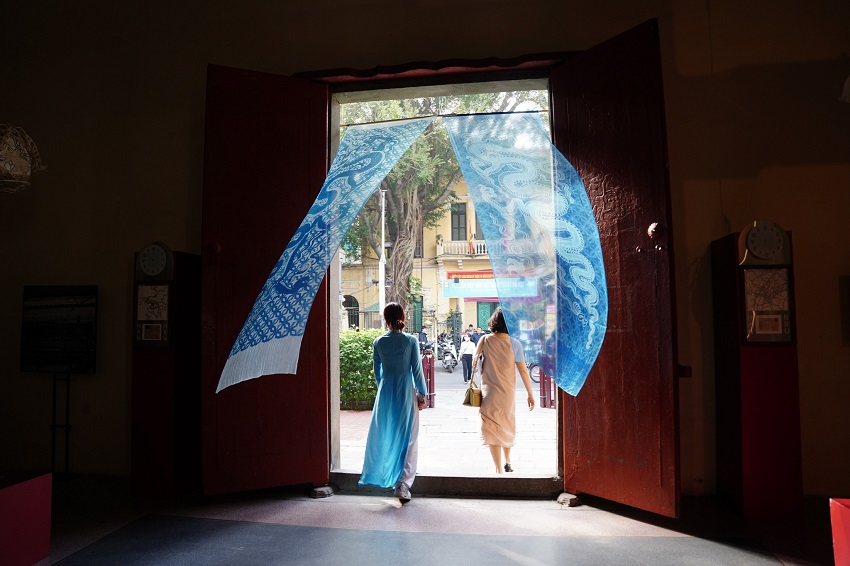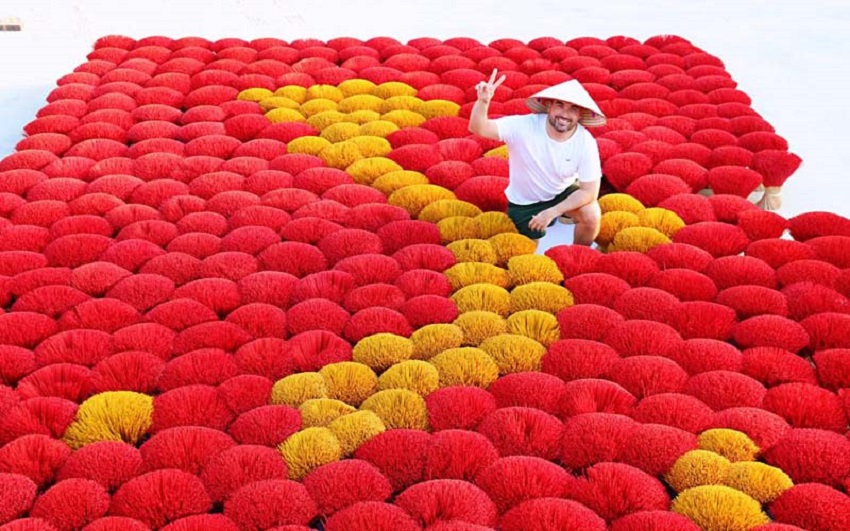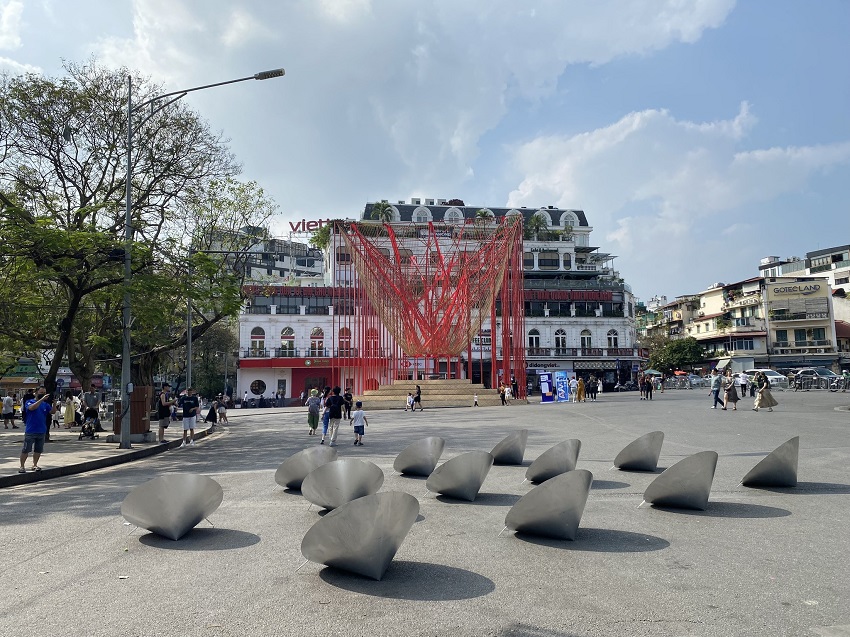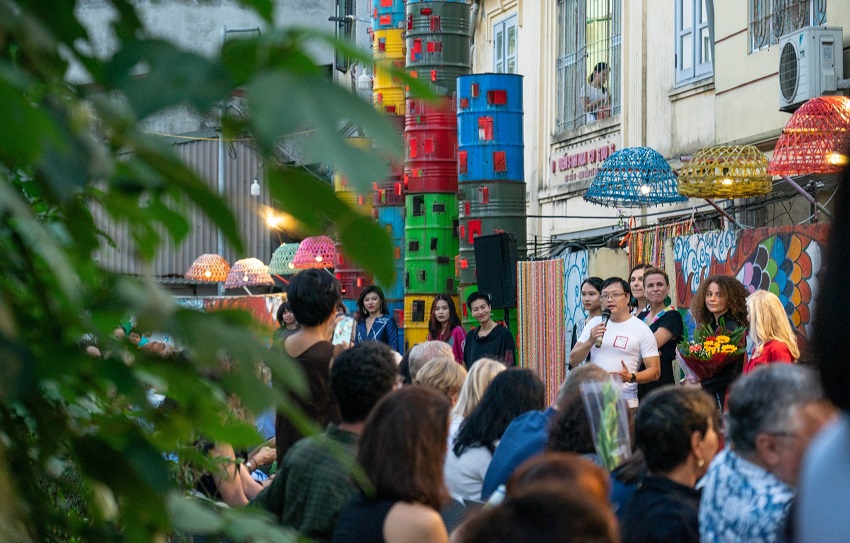Heritage values - a powerful asset for Hanoi's cultural industry development
The capital city will implement policies to create a premise for the development of the cultural industry.
Rich cultural heritage is an invaluable asset that can help the capital lead the development of the cultural industry. Based on lessons learned, the Hanoi model will be replicated across the country, said Deputy Secretary of the Municipal Party Committee Nguyen Van Phong told the 2022 Culture Conference in Hanoi on December 17.
| A space in the Hanoi Creative Design Festival 2022- the silk installation titled Ngu hanh or 'Five Elements' Ngu Hanh Artwork by artist Pham Tuan Ngoc |
Great achievements
In terms of tourism, in 2019, Hanoi welcomed nearly 29 million visitors, equivalent to 1/3 of the number of tourists nationwide. The city is always on the World Tourism Organization's voted list of top destinations in Asia and the world.
In addition, the city's economic structure is shifting towards a rapidly growing service sector, rising from 57.2% annually to 64.1% in the 2015-2020 period. GDP per capita in 2020 has reached $5,325, 2.3 times higher than in 2010.
"Hanoi has increasingly developed in the direction of youth, modernity, and creativity, based on the historical and cultural background of thousands of years of civilization. It became one of the most dynamic cities in the world in 2019 according to The City Momentum Index by Jones Lang LaSalle," he stressed.
| A foreign traveler took a photo at Quang Phu Cau incense-making village in the suburban area of Hanoi. Photo: Le Giang |
Earlier, the Hanoi People's Committee had released a plan to develop the cultural industry in the capital for 2021-2025, focusing on 2030 and a vision to 2045, in which the industry would contribute around 5% of the city's GRDP.
It would also aim for revenues from cultural industries to increase year on year, contributing around 8% of the city's GRDP by 2030. By 2045, it will be a lever for developing other industries and a premise for turning Hanoi into a city with a high standard of living and quality of life, contributing around 10% of the city's GDP.
The city will expand international exchanges and cooperation and implement Hanoi's initiatives committed to the United Nations Educational, Scientific and Cultural Organization (UNESCO) when it joined the Creative Cities Network. The capital's cultural industry will become an important economic sector, creating a new driving force for economic, cultural, and social development, honoring and developing the "City for Peace" or "Creative City" brand.
Therefore, Hanoi will focus on developing a number of sectors with advantages and potentials, such as cultural tourism, handicrafts, performing arts, cinema, design, gastronomy, software and game entertainment, advertising, architecture, television and radio, publishing, and fashion, among others.
Unified determinations
| The creative space in the pedestrian zone around Hoan Kiem Lake during Hanoi Creative Design Festival 2022 that took place last month in Hanoi. Photo: HCDF |
First, the development of the cultural industry is based on the development of Vietnam's culture and people in general and the capital Hanoi in particular;
Second, the development of the cultural industry should be based on the principle of ensuring harmony between conservation and development while promoting to the maximum the potentialities, strengths, and values of the traditional culture with a unique identity of the capital with a thousand years of civilization;
Third, promoting the development of the cultural industry is the responsibility of the whole political system, departments, and people from all walks of life, based on the spirit of "investing in culture is investing in sustainable development";
Fourth, the development process of the cultural industry must go hand in hand with the improvement of the cultural market, making the most of the capital's advantages;
Fifth, Hanoi must ensure infrastructures and create an environment and innovation ecosystem that is needed for the development of cultural industries;
Sixth, Hanoi authorities will complete cultural development plans, mechanisms, and policies to mobilize, invest, maximize and effectively utilize all resources to build a modern, culture-rich, and sustainable capital of Vietnam.
Hanoi’s proposes
| A program commemorating the late talented Spanish designer Diego Chula for his contributions to Hanoi took place on November 18 within the framework of the Hanoi Creative Design Festival 2022. Photo: HCDF |
Speaking at the conference, Deputy Secretary of the Municipal Party Committee Nguyen Van Phong also suggested that Hanoi achieve its cultural industry development goals as planned.
"The State must have specific institutions for building the cultural industry," he said.
It is necessary to have a master plan on culture and cultural industry of the whole country as a foundation to regulate management and promote the strengths of each locality and each field; prevent many localities from holding a festival at the same time."
In addition, Hanoi wants to develop both public and private cultural funds," he added.
Phong concluded that Hanoi is willing to become a pilot locality in developing the cultural industry as a premise for replicating the model nationwide.
















